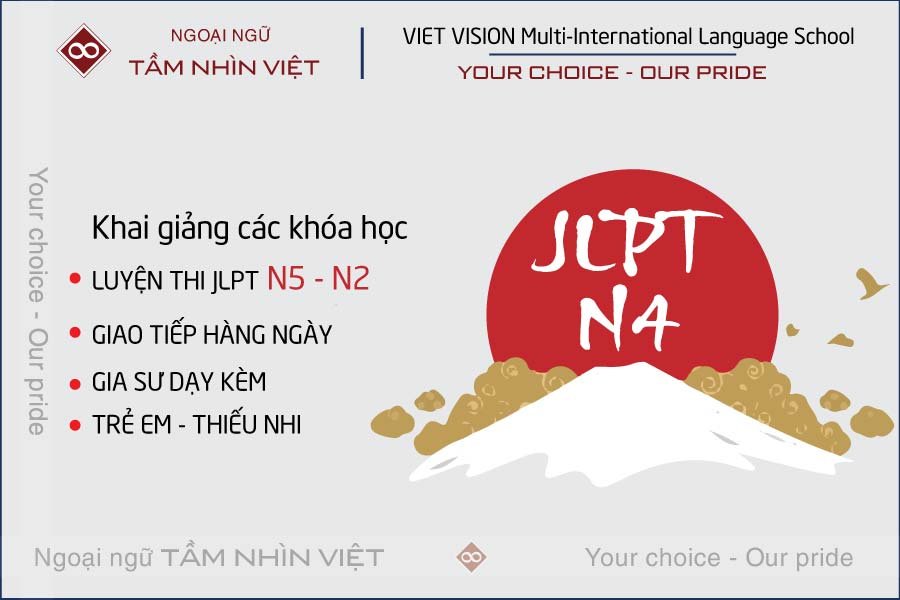Hôm nay chúng ta sẽ đến với Bài số 25 – Từ vựng tiếng Nhật Minna No Nihongo + Giải thích ngữ pháp.
Trong bảng từ vựng bên dưới có chữ Hiragana, katakana và Kanji và diễn giải bằng tiếng Anh. Nếu bạn nào chưa biết các bảng chữ cái trong tiếng Nhật thì có thể xem lại tại đây: Tổng hợp các bảng chữ cái trong tiếng Nhật
Trong bài học, ngoài từ vựng còn có phần giải thích ngữ pháp rất cặn kẽ. Tuy nhiên, một điều lưu ý là bài học được thiết kế dành cho các bạn có nền tảng kiến thức tiếng Anh tốt. Nếu bạn nào không tự tin, có thể sử dụng ứng dụng Google Translate để dịch thành tiếng Việt nhé!
- Có thể bạn quan tâm: Khóa học tiếng Nhật luyện thi chứng chỉ JLPT từ N5 – N3 tại Ngoại ngữ TẦM NHÌN VIÊT

# Bảng từ vựng tiếng Nhật Minna No Nihong
| NO | WORD | KANJI | MEANING |
| 1 | かんがえます | 考えます | think, consider |
| 2 | つきます[えきに~] | 着きます[駅に~] | arrive (at the station) |
| 3 | りゅうがくします | 留学します | study abroad |
| 4 | とります[としを~] | 取ります[年を~] | grow old |
| 5 | いなか | 田舎 | countryside, hometown |
| 6 | たいしかん | 大使館 | embassy |
| 7 | グループ | group | |
| 8 | チャンス | chance | |
| 9 | おく | 億 | hundred million |
| 10 | もし[~たら] | if ~ | |
| 11 | いくら[~ても] | however ~, even if ~ | |
| 12 | てんきんします | 転勤します | be transferred to another office |
| 13 | こと[~のこと] | thing, matter (thing about ~) | |
| 14 | いっぱいのみましょう | 一杯飲みましょう | Let’s have a drink together |
| 15 | [いろいろ]おせわになりました | お世話になりました | Thank you for everything you have done for me |
| 16 | がんばります | 頑張ります | do one’s best |
| 17 | どうぞおげんきで | どうぞお元気で | Best of luck (said when expecting a long separation) |
# Giải thích một số ngữ pháp tiếng Nhật trong bài học![]()
1. Plain past form ら、~
If …
When らis attached to the past tense plain form of verbs, adjectives, etc., it changes the preceding clause into a conditional expression. When a speaker wants to state his opinion, situation, request, etc., in the conditional, this pattern is used.
お金があったら、旅行します。
If I had money, I would travel.
時間がなかったら、テレビを見ません。
If I don’t have time, I will not watch TV.
安かったら、パソコンを買いたいです。
If it’s inexpensive, I want to buy a personal computer.
暇だったら、手伝ってください。
If you are free, please give me a hand.
いい天気だったら、散歩しませんか。
If it’s fine, won’t you take a walk with me?
2. Vた-formら、~
When …/After …
This pattern is used to express that a certain action will be done or a certain situation will appear when a matter, action or state which is sure to happen in the future has been completed or achieved. The main sentence is always in the present tense.
10時になったら、出かけましょう。
Let’s go out when it gets to ten.
うちへ帰ったら、すぐシャワーを浴びます。
I take a shower soon after I return home.
3.
Vて-formい-adj (~い ) → ~くてな-adj [な] → でNで |
も、~ |
Even if … |
This expression is used to present a reverse condition. Contrary to plain past form ら、~, this expression is used when an action which is expected to be taken or an event which is expected to happen naturally under the given circumstances does not materialize or a thing turns out in a way opposite to a socially accepted idea.
雨が降っても、洗濯します。
Even if it rains, I’ll do the laundry.
安くても、わたしはグループ旅行が嫌いです。
Even if group tours are expensive, I don’t like them.
便利でも、パソコンを使いません。
Even if a personal computer is useful, I won’t use it.
日曜日でも、働きます。
Even if it is Sunday, I will work.
4. もしandいくら
もしis used in a sentence in the plain past form to indicate beforehand that the sentence is going to present a condition, while いくらis used with ~ても(~でも)to do the same. もしimplies that an emphasis is on the speaker’s supposition while いくらis meant to stress the degree of conditionality.
もし一億円あったら、いろいろな国を旅行したいです。
If I had 100 million yen, I would want to travel to various countries.
いくら考えても、わかりません。
No matter how much I think, I can’t understand this.
いくら高くても、買います。
No matter how expensive it is, I will buy it.
5. Nが
As mentioned in Lesson 16, 4. [Note], the subject of a subordinate clause is indicated by が. In subordinate clause using たら, ても, とき, と, まえに, etc., in addition to から, the subject is indicated by が, as shown below.
友達が来るまえに、部屋を掃除します。
I will clean my room before my friends come.
妻が病気のとき、会社を休みます。
When my wife is sick, I take a day off work.
友達が約束の時間に来なかったら、どうしますか。
If your friend doesn’t come on time, what will you do?
Như vậy, chúng ta đã kết thúc Bài số 25 – Từ vựng tiếng Nhật Minna No Nihongo + Giải thích ngữ pháp
Hãy tiếp tục theo dõi các bài học về từ vựng tiếng Nhật trong sách giáo trình Minna No Nihongo tại đây: Tổng hợp các bài học từ vựng tiếng Nhật theo giáo trình Minna No Nihongo
Bonus: Sách hiện có bán trên các kênh thương mại điện tử như Amazon, Tiki, Lazada, nhà sách Fahasa…
Có nhiều bạn sẽ thắc mắc là tại sao phải học từ vựng từ quyển sách giáo trình Minna No Nihongo? Nếu bạn chưa biết thì mình sẽ nói đơn giản như sau: Đây là giáo trình tiêu chuẩn quốc tế cho bất kì ai học tiếng Nhật Bản, được giảng dạy ở hầu hết các trường đại học trên toàn thế giới.
Cảm ơn bạn đã quan tâm và theo dõi bài học!
